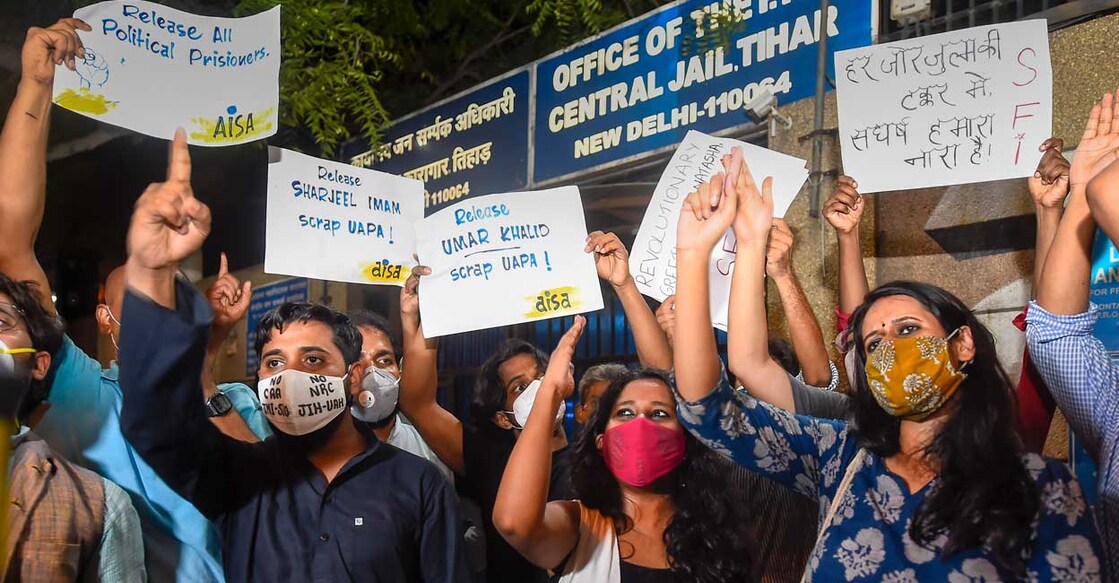Delhi riots: Student activists Natasha, Devangana, Asif released on bail

Mail This Article
New Delhi: Student activists Natasha Narwal, Devangana Kalita and Asif Iqbal Tanha walked out of Tihar prison on Thursday, hours after a court here ordered their immediate release in the north-east Delhi riots "conspiracy" case.
The order came two days after the Delhi High Court granted bail to Narwal, Kalita and Tanha, who were arrested in May last year under the stringent Unlawful Activities (Prevention) Act (UAPA).
Director General (Delhi Prisons) Sandeep Goel confirmed that all three have been released.
A senior jail official said Kalita and Narwal were released around 7 pm and Tanha around 7.30 pm.
'Got tremendous support inside jail'
Walking out of the jail, student activist Natasha Narwal said they had received "tremendous support" inside Tihar Jail in Delhi and would continue their struggle.
JNU students Narwal and Kalita thanked their friends and well-wishers, many of whom gathered outside the jail, for supporting them during their year-long stay behind bars.
"We have received tremendous support inside jail and we will continue our struggle," Narwal told reporters.
Welcoming the Delhi High Court order granting them bail, Narwal, an activist of women collective Pinjra Tod, said that when they were arrested, it took them many months to believe that they were in jail under such stringent charges.
Hitting out at the government, Kalita said people are in jail for raising their voice.
"They are trying to suppress the voice of people and dissent. We got a lot of support from people which helped us survive inside (jail)," she said.
On the delay in their release after the high court granted them bail, she said it was unbelievable because they had secured bail two-three days ago.
"...still we were inside jail. I almost kept expecting that some police officers will come and arrest me," she added.
Walking out of Tihar Jail, Jamia Millia Islamia student Tanha said he had kept hope that he would be released one day and asserted that the fight against the CAA, NRC and the NPR would continue.
Immediate release after Delhi HC intervention
The three student activists were not released from the prison on time over delays in verifying their addresses and sureties.
In its order for the immediate release of the trio, the Delhi court said the delay in the verification process by the police could not be a plausible reason for the accused to be kept imprisoned.
After securing bail from the high court, the activists had moved the trial court, seeking immediate release from prison.
When the trial court deferred the order on their plea for Thursday, they moved the Delhi High Court, which ordered the lower court to proceed with the issue with "promptitude and expedition".
The three student activists were arrested in May 2020 and are accused of being the "masterminds" of the February 2020 violence, which left 53 people dead and more than 200 injured.
The high court, while granting them bail on June 15, had observed that "in an anxiety to suppress dissent, the state has blurred the line between right to protest and terrorist activity" and if such a mindset gains traction, it would be a "sad day for democracy".
The Delhi Police has, however, moved the Supreme Court, challenging the high court judgement granting them bail in the case.
SC to hear appeals on Friday
The Supreme Court is scheduled to hear on Friday the appeals of Delhi Police challenging the Delhi High Court verdicts granting bail to three student activists in a case related to the last year's communal violence in north-east Delhi during protests against the Citizenship Amendment Act (CAA).
A vacation bench of Justices Hemant Gupta and V Ramaburamanian will hear three separate appeals filed by Delhi police which said that the High Court's findings are perverse and contrary to record and appeared to be based more on the social media narrative.
Delhi Police have approached the top court challenging the High Court three separate verdicts granting bail to Narwal, Kalita and Tanha, who were arrested last May under the provisions of stringent Unlawful Activities (Prevention) Act (UAPA).
The police has sought stay of Tuesday's three judgements which said in its anxiety to suppress dissent the State has blurred the line between right to protest and terrorist activity and if such a mindset gains traction, it would be a "sad day for democracy".
In the hurriedly filed appeals, the investigators have dubbed the judgements as "mini trial" and said such observations were unfounded and perverse insinuation.
Further, the Delhi Police contended that the bail was granted to the three accused on an irrelevant consideration which will have far reaching consequences for cases investigated by NIA and other investigating agencies.
The high court not only conducted a mini-trial but has also recorded perverse findings which are contrary to record and almost decided the case while adjudicating bail pleas," said the police while seeking to set aside three bail verdicts.
The appeal said the findings of the high court appeared to be based more on the social media narrative than the evidence gathered and elaborated in the charge sheet.
It said the high court decided the case on a pre-conceived and a completely erroneous illusion, as if, the present case was a simpliciter case of protest by students.
(With PTI inputs)

